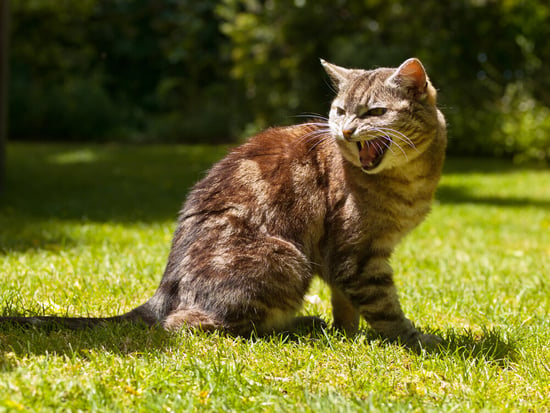Aggression in Cats: Causes & How to Stop It

Table of Contents
If you're a cat parent, you might have noticed that cats can sometimes be a bit of a mystery, and that includes when they start acting aggressively. This aggression might show up as hissing, growling, swatting, or even biting. While it may be tricky to understand, it's important not to ignore it.
When your cat is acting this way, they're trying to tell you something. It's not just about stopping the aggression - it's about understanding what your cat needs and ensuring they feel happy and safe.
Key Takeaways:
- Cat aggression can be triggered by fear, pain, territorial instincts, play behavior, and more.
- Recognize warning signs like changes in body language and vocalizations to manage aggression.
- Address triggers, provide mental stimulation, ensure good health, and seek professional help for persistent aggression or sudden behavior changes.
What Is Aggression in Cats?
Aggression in cats is when they show behaviors that seem threatening or harmful. This behavior could be directed to other cats, people, or even objects around the house. You might see your cat hissing, growling, or swatting with their paws. In more serious cases, they might try to bite or scratch. Every cat is different, and they might show aggression in different ways.
But no matter how it manifests, aggression is a sign that your cat feels stressed, scared, or upset about something. It's their way of trying to protect themselves or get control over a situation that they find scary or threatening.
Have Pet Behavior Worries?
Get expert advice for common behavior issues like separation anxiety and health issues due to environmental stress.
Common Causes for Aggression in Cats
Cat aggression can manifest in various forms, including fear aggression, pain-induced aggression, territorial aggression, and more. Understanding these different types of aggression is essential as each has distinct underlying causes and requires a specific approach to address.
Here is a breakdown of each common type & cause of feline aggression:
Fear Aggression
This happens when a cat feels scared or threatened. Cats can respond by hissing, growling, or puffing up their fur to appear more intimidating.
Pain-Induced Aggression
When a cat is unwell or in pain, they may perceive their surroundings as threatening, leading to swatting or biting, even towards familiar people.
Territorial aggression
Cats are territorial by nature and can react aggressively if they feel their space is invaded, which could be triggered by a new pet, person, or a change in their environment.
Redirected aggression
If a cat becomes upset or frustrated by one thing but can't respond directly to it, they may turn their aggression onto someone or something else nearby.
Play aggression
Cats, especially kittens, often show aggressive behaviors during play. If not guided towards toys or managed correctly, actions like pouncing or swatting can escalate, turning their play into more serious aggression. Some cats may even get the zoomies, which involves them racing about the house unexpectedly.
Maternal aggression
A mother cat can become aggressive when she's protecting her kittens. This natural protective behavior can sometimes be directed toward owners or other household pets.
Petting-induced aggression
This type of aggression occurs when a cat reacts aggressively to being petted. Some cats may enjoy being petted initially but then suddenly lash out after a certain threshold is reached.
Inter-cat aggression
This happens when aggression is directed at other cats. This could be due to territorial disputes, fear, or dominance behaviors. It's particularly common in multi-cat households.
When your cat's behavior leaves you puzzled, turning to a veterinarian can be incredibly helpful. They're equipped to offer the insights you need to assist your feline friends effectively.
Warning Signs & Symptoms of an Aggressive Cat
Cats communicate their feelings through their behavior, and attentive observation can help us notice signs of discomfort or threat. These warning signs vary from subtle behavior changes to more pronounced actions.
Here are some common signs of feline aggression to watch for:
- Changes in Body Language: Look for signs of tension or alertness, such as dilated pupils, flattened ears, and a tense posture.
- Vocalizations: Listen for unusual growls or hissing instead of their usual purring, indicating discomfort.
- Physical Signs: Watch for an erect tail with raised hairs, arched back, or swatting motions to signal "back off."
- Fear Indicators: Recognize flattened whiskers, a tucked tail, and a raised head while lying prone as signs of fear.
- Aggressive Actions: Be cautious of scratching or biting, which may occur if the source of stress remains unresolved.
Should My Pet Be Seen by a Veterinarian?
1. Have you noticed changes in your pet’s appetite?
2. Does your pet have diarrhea or loose stools?
3. Have you noticed changes in your pet’s thirst/water consumption?
4. Is your pet having accidents in the house?
5. Is your pet pacing and unable to settle?
6. Is your pet panting more than usual?
7. Is your pet whining or vocalizing more than usual?
8. Is your pet shaking more than usual?
9. Is your pet hiding or avoiding physical contact more than usual?
10. Is your pet more lethargic and sleeping more than usual?
11. Are you concerned about changes in your pet’s behavior?
12. Is your pet scratching their ears?
13. Is your pet licking their paws more than usual?
14. Does your pet have a rash?
15. Is your pet moving more slowly than usual or having a harder time getting up or down?
View Results
Should My Pet Be Seen by a Veterinarian?
1. Have you noticed changes in your pet’s appetite?
2. Does your pet have diarrhea or loose stools?
3. Have you noticed changes in your pet’s thirst/water consumption?
4. Is your pet having accidents in the house?
5. Is your pet pacing and unable to settle?
6. Is your pet panting more than usual?
7. Is your pet whining or vocalizing more than usual?
8. Is your pet shaking more than usual?
9. Is your pet hiding or avoiding physical contact more than usual?
10. Is your pet more lethargic and sleeping more than usual?
11. Are you concerned about changes in your pet’s behavior?
12. Is your pet scratching their ears?
13. Is your pet licking their paws more than usual?
14. Does your pet have a rash?
15. Is your pet moving more slowly than usual or having a harder time getting up or down?
Share Quiz
How to Manage and Prevent Feline Aggression
Managing and preventing aggression in cats begins with understanding their triggers. Whether it's a particular person, another pet, or a specific situation that unsettles your cat, identifying these triggers allows you to work around or avoid them. Ensuring your cat is mentally stimulated and not bored can also prevent aggression.
For instance, if your cat feels stressed in crowded spaces, providing a quiet, safe retreat in your home can be beneficial. Incorporating elements that cats love, like toys or catnip, can make this space even more appealing to them.
It's also essential to ensure your cat is in good health, as conditions like hyperthyroidism can provoke aggressive behavior. Regular vet checkups can help detect and treat such health issues early, preventing discomfort or pain that might lead to aggression.
When your cat exhibits aggressive behavior, often the best approach is to give them space to calm down. Cats are independent creatures, and forcing interactions during these stressful moments can escalate aggression.
Aggression usually indicates a deeper issue and responding negatively can exacerbate the problem. If you're unsure about managing your cat's aggression, don't hesitate to consult a veterinarian. Their expert advice can guide you with strategies tailored to your cat's needs.
When to Seek Professional Help
If your cat's aggressive behavior is persistent, escalating, or causing harm to themselves or others, it's time to contact a professional. This could be a veterinary behaviorist or a veterinarian with expertise in feline behavior.
It's essential to seek help if the aggression seems to come out of nowhere. Sudden changes in behavior can often be a sign of an underlying health issue. Conditions like hyperthyroidism, arthritis, dental disease, or even certain types of infections can cause discomfort or pain that leads to aggression.
Working closely with a veterinarian is crucial in these situations. Regular vet appointments are key to keeping your cat healthy and happy. They can help rule out any medical problems and provide guidance on managing aggression effectively. They might recommend behavioral therapy, environmental changes, or in some cases, medication.
Conclusion
Managing cat aggression is about decoding behavioral signals, understanding potential triggers, and maintaining a healthy environment for your cat. When the challenge seems too great, professional guidance can be a game-changer, paving the way for a more peaceful living situation with your feline friend.
Frequently Asked Questions
Why is my cat being aggressive all of a sudden?
A cat might suddenly become aggressive due to various factors, such as an underlying health issue causing them pain or discomfort, changes in their surroundings causing stress, or adjustments in their relationships with other pets or people in the house.
Why is my cat suddenly aggressive toward my other cat?
Your cat might suddenly show aggression toward another cat due to territorial disputes, changes in the home environment, or health issues causing discomfort. If this behavior persists, it's advisable to consult a veterinarian or a cat behaviorist to understand the underlying cause.
Why does my cat get aggressive at night?
Cats might display aggression at night due to their natural hunting instincts which become more active during this time. Changes in the home environment, like less activity or different noises, can also contribute.
What do vets do with aggressive cats?
Veterinarians typically start by ruling out any health issues that might be causing aggressive behavior in cats. They might suggest changes in the home environment or recommend behavioral therapies. In some cases, medication may be prescribed to help manage the aggression.
Is there medication for aggressive cats?
Yes, in some cases, veterinarians might prescribe medication to help manage aggression in cats. These could include anti-anxiety drugs or other types of behavioral medication.
Will neutering a cat help with aggression?
Neutering a cat can help reduce certain types of aggression, especially those linked to territorial or sexual behavior. However, it's not a guaranteed solution for all forms of aggression, particularly if the behavior is linked to fear, anxiety, or a medical condition.






